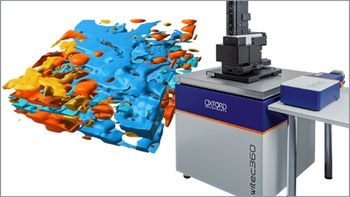
The Global Chemical Industries Summit: From Raw Material Identification to Fine and Specialty Chemicals Analysis for Hydrocarbons, Agrochemicals, and Pharmaceuticals (Day 1)
Thursday, September 30 at 10am EDT | 3pm BST | 4pm CEST and 1pm EDT | 12pm CDT | 10am PDT Discover the latest advances in instrumentation and applications for hydrocarbon processing, agrochemicals, and pharmaceuticals.
Register Free:
Day 1: Hydrocarbon Processing
Summary:
The Hydrocarbon Process Industry (HPI) Symposium will discuss topics and analysis challenges facing HPI related to oil and gas products. In this summit, global leaders and industry professionals will join academic and government scientists to share their work, insights, and vision for the future. As a global analytical solutions leader with proven technologies and experience in refining and natural gas labs, PerkinElmer's is pleased create a forum for engagement by this community.
Key Learning Objectives:
- Explore the uses of different detectors in gas chromatography for fuel analysis
- Learn about alternative carrier gases to the expensive and limited helium for different ASTM methods
- Discover new approaches for Fuel Analysis and Certification
Morning
10:00am EDT – 10:30am EDT
Determination of Olefins in Condensates and Upgraded Bitumen by Gas Chromatography (GC)-Vacuum Ultraviolet Detection (VUV)
Chris Goss, Research Technologist, Innotech Alberta
This presentation will discuss the use of the VUV detector in relation to detection, identification, and deconvolution of olefins to achieve detection limits, method dynamic range, and accuracy. Olefins and diolefins are studied because of the effect they can have in the transportation and stability of upgraded bitumen and refined products. Olefins are hard to identify by other analytical methods, and the VUV detector proved to be an excellent choice for the verification and identification of olefins.
10:30am EDT – 11:00am EDT
Overall Responsibility for Your Individual and Turnkey Lab Solution by OCS
Peter Frey, Senior Technical Manager, OCS
Would you like to be able to run quality tests and take material samples during the ongoing production process and, at the same time, carry out the associated analysis in your own company? This is no problem with the turnkey laboratory solutions from OCS! Furthermore, OCS is also manufacturer of well-known quality control measurements and equipment.
11:00am EDT – 11:30am EDT
Determination of Organic Chlorides in Crude Oil by Gas Chromatography (GC) Using a Halide Specific Detector (XSD)
Chris Goss, Research Technologist, Innotech Alberta
Organic chloride contamination in crude oil can cause corrosive hydrochloric acid (HCL) formation. Current quantitation of organic chlorides involves distillation of a naphtha cut, followed by a washing of the sample to remove hydrogen sulfide and salts, and then analysis. Using a GC-XSD will eliminate the need for distillation and sample washing, therefore, reducing labor, sample handling, and the chance of false positives by olefin production and subsequent reactions during distillation.
11:30am EDT – 12:00pm EDT
The Evolution of Solving Problems in Live Crude Streams
Chris Goss, Research Technologist, Innotech Alberta
Live crude oil contains a variety of volatile components. To get an accurate composition of a crude, for processing, spill hazards, corrosive gas content and vapor pressure methods have to be developed to get a representative sample and transfer that sample into the gas chromatograph (GC) without any loss of the volatile components. This presentation will explore several methods developed to accurately measure the volatile components.
Speakers:
Chris Goss
Research Technologist
Innotech Alberta
Peter Frey
Senior Technical Manager
OCS
Sponsors:
PerkinElmer
Afternoon
1:00pm EDT – 1:30pm EDT
A Platform Approach to Fuels Analysis and Certification
Dan Wispinski, Standard Methods Development Manager, VUV Analytics
Historically the analysis and certification of gasoline, jet fuel, diesel and biodiesel blends has required the use of numerous analytical technologies and methodologies. These analytical approaches are often expensive to acquire and maintain and due to their complexity can require specialized laboratory resources to operate. This impacts laboratory budgets, operational efficiency, and the quality of results. A platform-based approach to fuels analysis that employs a single, automated analytical approach using Gas Chromatography (GC)- Vacuum Ultraviolet Spectrometry (VUV) will be described. Several standardized industry and regulatory methods will be featured.
1:30pm EDT – 2:00pm EDT
Examination of the Effect of Alternative Carrier Gases on Three ASTM Methods
Lee Marotta, Principal Field Application Scientist, PerkinElmer
Leeman Bennington, Sr. Field Application Scientist, PerkinElmer
Helium is the most commonly used carrier gas in gas chromatography (GC). However, because of its rising cost and regional shortages, the community is investigating alternative carrier gases. This presentation will focus on meeting criteria for ASTM methods D3606 (procedures A and B), D4815, and D5580 using hydrogen and nitrogen and comparing these results to helium.
2:00pm EDT – 2:30pm EDT
Projects, Processes & Analysis of Refining and Petrochemical Products
Teresa Ruiz, Business Development Manager EPC projects, SGS EPC LABORATORY SERVICES
TBD
2:30pm EDT – 3:00pm EDT
Verified Hydrocarbon Analysis: A Fast, Accurate, and Automated Alternative to Traditional Detailed Hydrocarbon Analysis (DHA)
Dan Wispinski, Standard Methods Development Manager, VUV Analytics
Characterization of hydrocarbon streams, including speciation and quantitation, has traditionally been accomplished using Detailed Hydrocarbon Analysis, or DHA, by GC-FID. Requiring long run times, very good chromatographic separation, and significant manual review of data, traditional DHA has changed little since it was first introduced over 40 years ago. Verified Hydrocarbon Analysis™ is a modern approach to traditional DHA using Gas Chromatography (GC)- Vacuum Ultraviolet Spectroscopy (VUV) and spectral validation to characterize complex hydrocarbon streams – accurately, without the need for human intervention, and in a fraction of the time of traditional DHA. This presentation will describe the technology and method required to successfully implement VHA.
Speakers
Dan Wispinski
Standard Methods Development Manager
VUV Analytics
Lee Marotta
Principal Field Application Scientist
PerkinElmer
Leeman Bennington
Sr. Field Application Scientist
PerkinElmer
Teresa Ruiz
Business Development Manager EPC projects
SGS EPC LABORATORY SERVICES
Sponsor
PerkinElmer
Register Free:
Newsletter
Get essential updates on the latest spectroscopy technologies, regulatory standards, and best practices—subscribe today to Spectroscopy.




